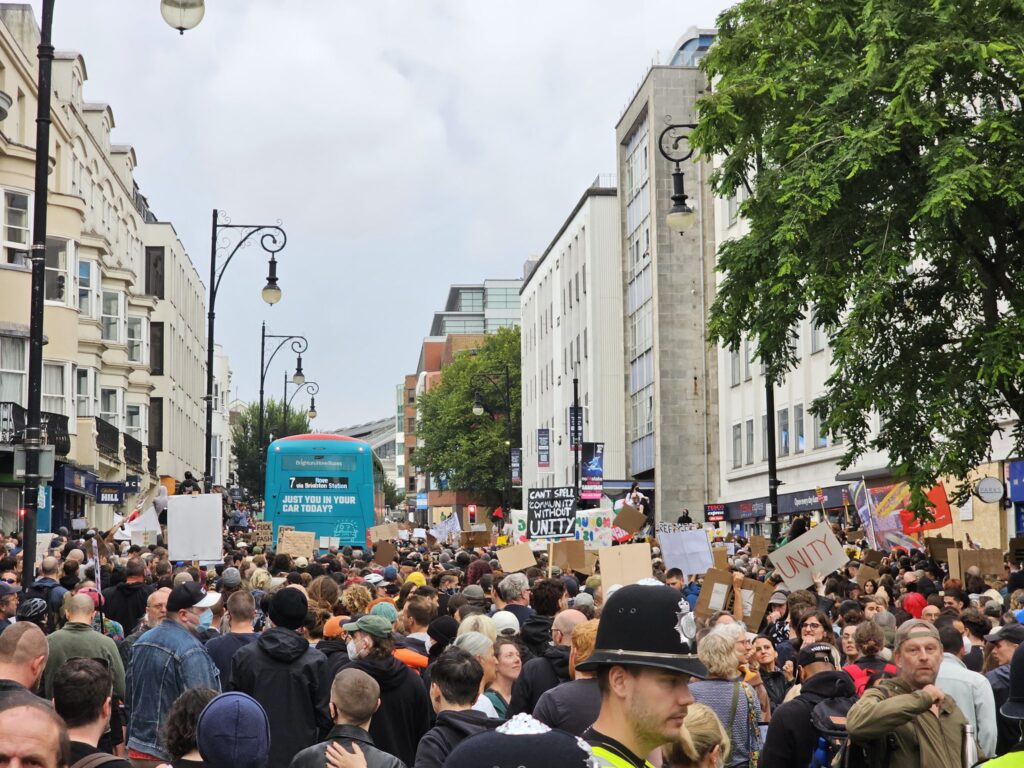Just over three weeks ago, three small girls in Southport, all under ten, were stabbed to death at a Taylor Swift dance workshop. Their names were Alice Dasilva Aguiar, Elsie Dot Stancombe and Bebe King.
Eight other girls were badly injured, as was Leanne Lucas, the girls’ female dance teacher, and a male passer-by who helped them.
An 18-year-old male has been charged with murder and attempted murder.
The incident has echoes of the 2017 Manchester Arena bombing, when a concert by Ariana Grande, like Swift an idol of young girls, was attacked by a young suicide bomber.
Islamist Salman Abedi killed 22 people, of whom 18 were female, nine of them little girls. Hundreds were injured.
Given apparent similarities, it is not surprising that people initially feared an Islamist connection in Southport.
Some may still think it a possibility, given recent reports of planned attacks on Taylor Swift events in Austria by a young man who, like the Manchester bomber, had pledged support to ISIS.
Whatever the truth, careful consideration of facts and honest responses to questions were required.
What actually happened was public disorder, misinformation on all sides, political posturing and point scoring. Mass rallies of the left took place, including here in Brighton.
The impact on victims and grieving survivors was forgotten – along with the terror of countless small girls learning, probably for the first time, that they are at risk of male violence in apparently safe places.
We should not speculate without evidence about the accused’s motivation. He is entitled to a fair trial. However, what we are free to observe is that, like the Manchester outrage, this was a high-profile attack on female victims.
The same is true of the rape and murder of Sarah Everard, the brutal death by beating of Zara Aleena, the homicide of sisters Bibaa Henry and Nicole Smallman as well as the lethal cross-bow attack on Carol, Hannah and Louise Hunt.
There are countless other examples including the very recent non-fatal stabbing of an 11-year-old girl with her mother in Leicester Square, in London.
The Southport killings took place in a context of epidemic levels of male violence against women and girls, including two to three homicides each week, and of a failing criminal justice system bedevilled by reports of incompetence, institutional sexism and criminal wrongdoing.
Despite this background, the first media reports of the Southport killings failed to acknowledge that the victims were female, repeatedly referring to them as “children”.
It was only after a shocked male witness was filmed saying that he feared “all the girls” were going to be killed that their sex began to be mentioned.
You might think that the newly elected Labour Prime Minister, who during the election campaign, promised to “halve violence against women”, would have commented, but he did not.
Neither did MP Jess Phillips who regularly tells us that Labour considers violence against women a “national emergency”.
Instead, Labour politicians, along with mainstream media and the police, and in unholy alliance with activists of the far left and the far right, preferred to focus attention not on the victims but on the immigration status of the accused, pitting campaigners for and against immigration against each other, making political capital out of public disorder.

In Southport, there have been vigils at which mourners could pay their respects and offer comfort to families. Beyond that, and in the absence of sound leadership and honest discussion, ordinary people aiming to express peacefully their concerns for their daughters and the safety of their communities have been left rudderless.
They are at the mercy of police they do not trust, a government unwilling to listen and fascists of varying kinds cynically preying on their communities.
Public outrage could have been redirected into public debate and peaceful expression of concern about women’s safety – as happened after the terrible death of Sarah Everard.
The Prime Minister could have led this by setting out realistic plans to safeguard communities from misogynist violence.
Instead, he threatened to make those involved in disorder feel “the full force of the law”, sparing no effort to do so.
Many arrests have followed, with offenders fast-tracked through special courts. Prison sentences have been severe, with spaces found in chronically overcrowded prisons previously said to be “full”.
A national “standing army” of 500 police officers has been identified to confront any further public unrest.
Female victims of male violence must be looking on in stunned disbelief. Their abusers are rarely arrested, still less charged or convicted. Sexual harassment remain unchallenged, as does most domestic violence, including life-threatening abuse by serial offenders.

The few rape cases actually charged can take years to reach court and conviction rates are low compared with other types of offending. Victims of homicide perish because earlier complaints were not addressed such as Shana Grice in Portslade. Chronic court delays remain the norm and sentences are too often light.
Yet now, at the government’s bidding, the criminal justice system has miraculously found the means and the time to prosecute, convict and imprison perpetrators of public order offences.
And although these offences were serious, they have not caused death nor serious injury. If ever there was an example of so-called “two-tier policing”, this is it.
The new Home Secretary Yvette Cooper has instructed us to show greater “respect” for the law and the police – obviously desirable in any well-organised society. However, given the way in which our criminal justice system has let women down, it is, as they say, some ask.
Since Sarah Everard was raped and killed by Wayne Couzens, a serving police officer, there have been numerous well-publicised reports of sexual and domestic violence, including homicide, by former and serving police officers, notably the sadistic rapist and serial woman beater David Carrick.
Northern communities are painfully aware of a history of police indifference to, and collusion with, violent abusers from politicians and celebrities like Cyril Smith and Jimmy Savile through to the notorious grooming gangs of Rotherham and elsewhere.

Police officers who attended the Southport attack are reported to have responded bravely and professionally but the truth is that it will take far more than fine words from politicians to build real trust.
We now know that when the government wants the criminal justice system to work, it has the means to make this happen.
I ask Keir Starmer, who so glibly promised to halve violence against women, to consider how much suffering, child abuse and rape could be prevented – and how many lives saved – if he gave policing misogynist violence the same priority as he has public disorder.
If he set up a new “standing army” of specialist police to combat domestic and sexual violence, freeing up court time and prison cells to process and contain offenders, as he has done with rioters, our families and communities would be very much safer.
As the Prime Minister knows, and his government has just revealed, all that is needed is the political will to act.
Jean Calder is a campaigner and journalist. For more of her work, click here.









Imagine seeing what’s unfolded and the biggest take is someone called the children, ‘children’ and not ‘girls’ especially when this opinion piece os from someone who has thrown vigorous arguments about not describing girls and girls, instead “young women” in her usual anti trans thing.
Also, the rioters have been “fast tracked” because they’ve been caught on film doing whatever they’ve done, and that’s always been the case no matter the crime, to use victims of rape and sexual assault as an attack on the government is vile.
You’ve nicely reinforced Jean’s point.